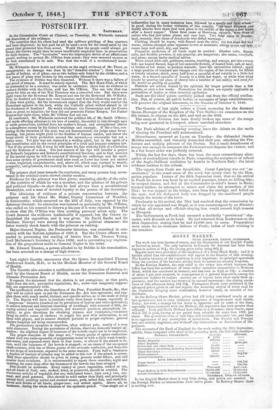POSTSCRIPT.
SATURDAY.
in the Commission Court at Clonmel, on Thursday, Mr. Whiteside resumed his dissection of the evidence.
The assertion that his client had used the military privilege of free quarters had been disproved: he had paid for all he used—even for the bread eaten by the guard that protected him from arrest. Would that the people could always get bread; the Crown might then be more beneficially employed than in prosecutions for high treason. The " barricades" were the impromptu device of an affectionate people, seeking to protect Mr. O'Brien from arrest: they were removed as i soon as he was ascertained to be safe. Was that the work of a revolutionar'y insur- rection?
Mr. Whiteside threw doubt and ridicule on the rapid evidence of Mr. Tfant, as exaggerated: no damage was done by the" dreadful crashes "; there were no marks of bullets, or of pikes; one or two bullets only found by the children, and a few panes of glass were broken by the constables themselves.
The evidence of Dobbin was then dissected. Without it there was a failure of any proof of treason. It must be utterly rejected. The Red Hand Club, of which he pretended to be a member, was never in existence: there WM no evidence to connect Dobbin with the Clubs, still less Mr. O'Brien. The one vote that was given for him as one of the War Directory was a cancelled vote. But there were eight votes for the Reverend Mr. Kenyon and one for the Reverend Mr. O'Malley. Now, he doubted not those men were innocent; and if so his client was not less so. If they were guilty, did the Government expect that the Jury would convict the Protestant agitator in the dock, while the Catholic priest walked abroad in all the freshness of freedom ? He would vindicate the Government and the Crown from so great an injustice; for they did not prosecute Father Kenyon. Yet Father Kenyon had eight votes, while Mr. O'Brien had not one. In conclusion, Mr. Whiteside reviewed the political life of Mr. Smith O'Brien; and made affecti,ng allusions to his love of country, descended to him through ages of noble generations, imbibed from his mother's breast, and strengthened almost to a dangerous excess by his father's teachings and example. If the crime, con- sisting in the intention of the soul, was not demonstrated, the judge must be un- bending, but jurors might yield to the frailties of human nature, and throw the broad shield of their protection around the accused,—a censurable but not a guilty man. Yet pity was not claimed in a wailing spirit, but in the spirit of a free constitution and on the rooted principles of a noble and humane common law. "Yet if the prisoner fall, I trust he will meet his fate with the faith of a Christian and the firmness of a man. The last accents of his lips will breathe a prayer for Ireland's happiness and Ireland's constitutional freedom; and in that moment of his mortal agony he will be consoled if through his sufferings and his sacri- fices some system of government shall arise such as I aver has never yet existed —wise, impartial, comprehensive, and, above all, which may conduct to wealth, prosperity, and greatness, the country he. has loved, not wisely perhaps, but too well."
The prisoner shed tears towards the conclusion, and many persons long accus- tomed to the criminal courts shewed similar emotion.
Evidence for the prisoner was then given; consisting chiefly of the rules of the societies of which he was a member, and the opinions of his private and political friends—to show that he had always been a constitutional Monarchist, and a man of devoted loyalty to the person of the Sovereign.
The admission of evidence of a private conversation between the prisoner and his friend Mr. Maher, Deputy Lieutenant of Wexford, at Enniscortlay, which occurred on the 23d of July, was opposed by the Attorney-General: its admission was insisted on personally by Mr. O'Brien, who called on his counsel to throwu p his ease if it were rejected. It tended to show that Mr. O'Brien was then avoiding personal arrest only. The Court deemed the evidence inadmissible if opposed; but the Crown re- linquished the opposition, and it was given. Sir David Roche and Sir Denham Norreys were among the witnesses to political character: the latter warmly shook hands with the prisoner on retiring.
Major-General Napier, the Peninsular historian, was examined in con- nexion with the Reform agitation of 1831-2. But the Crown officers suc- ceeded in preventing the reading of letters from Mr. Thomas Young, Lord Melbourne's Secretary in Juue 1832; and in preventing any explana- tion of the propositions made to General Napier in the letter.
Mr. Edward Trouton, a person alluded to by Dobbin in his examination, has been arrested on a charge of high treason.


























 Previous page
Previous page